- Home
- Alice Hoffman
Illumination Night
Illumination Night Read online
Illumination Night
A Novel
Alice Hoffman
To Sara Hoffman
1900–1985
To Lillie Lulkin
1903–1987
Chapter One
ILLUMINATION NIGHT
SIMON looks out his window and sees something white moving in the window of the house next door. It is the first Saturday in July and so hot that dragonflies light on his window ledge, too weak to fly. Simon lifts himself up by leaning his arms on the ledge; his toes are pressed against the baseboard molding. He can hear the ocean, which lies beyond a tangled field of beach plums and scrub pines. He can hear the white material in the window next door flapping against the bright blue sky, and his dog, an old German shepherd named Nelson, digging himself a hole in the dirt.
Simon, who will be four in November, has his own room, painted blue, up under the eaves. From here he can hear his father, Andre, working on his motorcycle out in the shed. The radio is turned on in the shed, and music spirals upward. Downstairs, in the kitchen, Simon’s mother, Vonny, lights the right rear burner of the stove. It’s an old black stove, and beneath the heavy metal the floorboards sway. The stove was installed in the twenties, as were the plumbing and the electricity that flickers whenever there’s a thunderstorm. The house itself—two small bedrooms upstairs, a kitchen, parlor, living room, bath, and sun porch downstairs—is a brown shingled cottage that sags in odd places. The ceilings are too low and the pipes moan. Outside, along a low stockade fence, old, dusky roses grow. The first time they saw the house, the year before Simon was born, Vonny could not believe Andre was actually considering it. There were bats in the upstairs bedrooms then, and a family of skunks lived under the porch. Andre had just sold his company—he designed and manufactured three-wheeled motorcycles—and they bought the house the way they got married, suddenly, startling themselves with their own recklessness. The weekend they bought the property was the first time either of them had been to Martha’s Vineyard. After the realtor showed them the house, they went out to lunch, then came back to explore on their own. Andre went immediately to the cellar, to inspect the foundation, and when Vonny went to look for him, her foot went right through the rotted wood of one of the steps. She lurched forward, then suddenly, as though the wood had released her, regained her balance. She sat down on the second step and began to cry. The flashlight Andre held made circles of light as he knelt to examine the rotten stair. He wore a white shirt and blue jeans and an old black jacket. He swung one leg over the splintered wood and watched her cry. Two hours later they bought the house.
It has been five years and Andre has never regretted it. On the other hand, in the dead of winter Vonny thinks a lot about Beacon Street. She hates the stove here; a draft always blows out the pilot light as she cooks, even on hot, still days. Today, she is fighting with the stove as she boils potatoes for potato salad. Simon can hear her reach into the cabinet for the big lobster pot as he takes off his pajama pants and gets shorts and a T-shirt out of his dresser. He pulls his p.j. top up and gets stuck inside. When he opens his eyes everything looks blue. He finally gets his p.j.s over his head, then sits down to dress himself. He is extremely proud of some of the things he is able to do. He loves the way his mother’s eyes widen when he manages something that was impossible even a week earlier. If the world ended at the front door, Simon would not care, although he might like to extend it a bit to include the shed and the stony path where he rides his bike—his father has bolted two wooden blocks to each pedal—as far as he’s allowed. Beyond that spot there is a cliff and, after a drop of twenty feet, a salt-water pond. The water there is so murky it is impossible to swim, but the beach is littered with false angel wings and bone-white crab claws and, in the height of summer, pink marsh mallows grow wild in the thickets.
Next door, Elizabeth Renny, who will be seventy-four this winter, holds up a white scarf. Through it, the wide expanse of lawn looks gauzy and far away. Beside her there are thin curtains that cling to her skin. This cottage is newer than the one next door, built at the turn of the century. She has lived here, in Chilmark, for more than fifty years. Last night, two starlings got caught in her chimney and Elizabeth Renny could hear them beating their wings all night. She could not sleep, and then this morning there was silence. Awake in her bed, Elizabeth suddenly felt light-headed and she has felt more and more giddy as the morning wears on. She wonders if the starlings managed to rise up in the chimney without moving their wings. When she looks outside, the sleeplessness and heat have a strange effect on her. She has been worried about the coming winter since May. She is all alone; her daughter lives in a suburb of Hartford, Connecticut. For the past year, there has been a film over her right eye. Lately a black spot has formed in the center of her vision. At night, she is frightened by silly things: the sound of crickets, branches brushing against the window, the pressure of a cat’s paw against her mattress. Now, she couldn’t care less. Through the scarf, everything looks white and she can feel her body lessen its pull on her. Usually, her bones feel as if they’re already drawing her into the earth. It smells sweet up here. Clover and rose of Sharon. In the pine tree a mockingbird leaves its perch and soars above the highest branches. Elizabeth Renny hears the calls of the birds she leaves bread for every morning: starling, cardinal, mockingbird, nuthatch. When she leans forward she sees that what she thought was a cloud is a cluster of white herons, effortlessly sweeping across the sky. Outside, there is music from the portable radio in the neighbor’s shed, but she doesn’t hear it. Simon is the only one who sees the white thing move into the air. Against the sky it’s like a cloud. For a moment it drifts toward the trees, then drops quickly. Up in his room, Simon can hear the sound of pinecones hitting the ground, or bones breaking. A clattering sound, which makes him think of his own kitchen. A spoon hitting against a metal pot.
THEY had fought over the shed and each thinks the other has won. Vonny had wanted it for her potter’s wheel, Andre for his motorcycles, and in the end there was an uneasy compromise. Andre set up Vonny’s kiln against the wall near a small window barred with wire mesh. On days when she fires pottery he pulls the bike he’s working on—currently a 1934 Norton—into the yard and spends the rest of the day in a black mood. When Vonny finally withdraws her plates and mugs, the shed is still so hot Andre has to wait hours before going back inside. On these days he works until midnight, although he has no timetable. He has come here to do what he wants—restore old motorcycles that he sells to collectors. Growing up in New Hampshire, he was taught not to talk too much, and not to listen much either. Now Vonny, who knew exactly what he was like when she married him, wants more from him. It would be as though he expected her to cross a bridge, when he knew from the start she would go a hundred miles out of her way to avoid one. He had been used to New Hampshire girls who went to bed with him for a price: a declaration of love, the possibility of a future, dinner at a steak house with several glasses of wine. When he moved to Boston, a sudden decision based on two feet of snow and the sound of his father coughing in the middle of the night, he spent a great deal of time going out with women who all seemed to have complicated plans they continued to think about while he was kissing them. Most of them left him because they were uncomfortable with his silence. Vonny did not—then, at any rate—expect him to talk. When they made love the first time, in his apartment, Vonny wore nothing but black knee socks patterned with blue roses. It had taken him completely by surprise that a woman who declared she was terrified of bridges would suggest they go to bed only a few hours after they’d met. When she closed her eyes and arched her back, Andre felt his skin grow hot and his chest constrict. He fell in love with the way she closed her eyes long before he fell in love with her.<
br />
This wanting to talk began with her pregnancy. She would wake him at three in the morning and want to discuss his childhood. She would grill him about his father—a county employee who drove a snow plow—and insist he consider the effects of his mother’s death—the car she was in had gone out of control on a stretch of ice when Andre was eleven. The way Vonny wanted him to talk was different from the other women he had known. There was an urgency to it that made him pull even further away. Sometimes, during her pregnancy, Andre dreamed he had to swim to shore in an ocean that grew deeper with every stroke he took, and when he woke the next morning his arms felt the strain.
He would never tell Vonny, but he enjoys being alone more than ever. He is alone, working on the Norton, when he hears the crash. Two of Vonny’s unglazed plates roll off the top of the kiln. Through the small window he can see a white thing with arms and legs. He sees it as it bounces upward from the ground, then collapses. The plates, which hadn’t broken when they fell, are shattered as Andre runs over them. He keeps right on running, through the hedge of lilacs that separates their yards. He can feel his body expanding and he feels the same sort of pounding in his head as he used to—and had forgotten about until this moment—the year his mother died, when he ran home from school every day, panicked until he reached his own front door.
When he kneels down, she looks like a bird caught in a net. His hands shake as he begins to pull the scarf that is wrapped around her off her face. Then, because he has the strong sense of interfering in something much too private, he stops and feels over the chiffon for her pulse. Her wrist bone is amazingly sharp; though he can’t tell if her pulse is weak or strong, it seems regular. He stands, not knowing whether he should leave the old woman alone. Then he runs to her house, in the back door, to the telephone on the kitchen counter. Two cats are on the table, lapping milk from a cereal bowl. Neatly creased and folded paper bags are wedged between the refrigerator and the counter. He dials 911 and in a voice that doesn’t sound at all like his own tells them that Mrs. Renny has had an accident.
AT the end of the month, when an ambulance delivers Elizabeth Renny back home, it has already been decided. Her daughter’s girl, Jody, will come to stay for the rest of the summer. Mrs. Renny’s daughter, Laura, who is a school psychologist in Hartford, has two other children, young sons, and a husband and can’t be expected to look after her mother, even if she has a broken collarbone and a broken leg, which, at her age, may or may not heal. When Jody was told about the decision she stayed out all night and refused to tell her parents where she had been. She alluded to a seedy nightclub in Pawtucket, Rhode Island, but in fact she had spent the night at her best friend Becky’s house, smoking cigarettes and crying and watching late-night TV. Her parents, who have problems of their own, now have the good fortune of simultaneously doing a good deed and getting rid of her. They settle Mrs. Renny in, move her bedroom from upstairs to the downstairs parlor, do enough food shopping to last two weeks, and leave on the ferry, distant enough at last to comment on how quickly time passes, how their daughter is growing up.
After her parents leave, Jody takes one look at the bedroom that was once Elizabeth Renny’s and is now hers, and realizes the depth of her parents’ betrayal. She is sixteen. Her hair, though long in the back, is clipped short in front; she wears a smudged line on each eyelid. She has been planning to escape from Hartford all along, but not to a house that smells like cats. They have gotten her a bicycle with a basket so she can ride to the local market, and have opened a checking account which, they have pointedly told her, will never contain more than a hundred dollars. Because there is no escape, Jody unpacks all of the things she has hidden from her mother: three bottles of nail polish, a tiny blue bathing suit, a package of red hair dye, her birth-control pills.
ALL that first evening Jody worries that now that they’re alone, she will have to actually talk to her grandmother. But Elizabeth Renny says next to nothing. Jody can tell she’s in pain; her grandmother keeps her eyes lowered as though she has done something wrong. Rather than be bored to death, Jody cleans the kitchen, feeds the two disgusting cats, and makes scrambled eggs and English muffins for dinner. She would kill for a frozen pizza. When she brings the tray into the parlor her grandmother says, “Oh, you shouldn’t. You don’t have to cook for me.” Yet she eats every bite, even though Jody knows she’s a terrible cook. Afterward, Jody rinses off the dishes, and when she comes back into the parlor with her grandmother’s medicine, she finds the old lady has fallen asleep. Jody wakes her and, as she holds out grandmother’s pills, their hands accidentally touch. Jody withdraws hers so quickly that several pills fall onto the carpet and she has to search for them in the cat hair and dust.
She knows her mother would love to see her groveling like a slave. At home, she wouldn’t even carry her own plate to the dishwasher. The whole thing is mortifying and she prays that her grandmother can go to the bathroom without her help. At seven o’clock she lets the cats out. At seven thirty she phones her friend Becky collect, and when Becky accepts the charges Jody bursts into tears.
“My parents will kill me when they get the phone bill,” Becky says, but Jody can tell she’s delighted, her kindness knows no bounds now that Jody has literally been cast into the sea.
“I’ll probably lose my mind in less than twenty-four hours,” Jody says.
Talking to Becky brings back some of her old spark, and when the cats start clawing at the screen, Jody kicks open the door with her bare foot. There are thin blue clouds in the sky and the high call of a mockingbird. Becky carefully recounts the reactions of all their friends when they heard that Jody had been sent away. Already, there are interesting rumors: a pregnancy, a drug problem, a divorce in the family. It is not even eight o’clock when Jody gets off the phone. At first this place seems absolutely silent, then there are strange noises: the hum of the refrigerator, gravel hitting against hubcaps when a car speeds by, the creak of the stairs when she goes up to her bedroom after locking the back door (something she would never think of doing at home) and making certain her grandmother is still asleep and—this she doesn’t admit to herself—alive.
She spreads out her comb and brush and nail polish on top of the painted white bureau, but it doesn’t help. She gets into her nightgown, but once in bed she hears squirrels running in the walls. Their weight against the plaster makes it seem as though they will break right through the walls and into her bed at any moment. She gets out of bed, pulls on a pair of shorts and a white sleeveless undershirt, then goes to the open window and lights a cigarette to calm her nerves. She has brought a clear glass ashtray up from the kitchen and now she balances it on the window ledge. Her eyeliner has rubbed off on the pillowcase and without it her gray eyes look much bigger. Impossible as it seems, the sky has only begun to grow dark. The leaves of the lilacs make a whispering sound and it’s still too hot. Jody smokes her cigarette, and just when she’s feeling a little better she hears footsteps outside. She’s not exactly a country girl; she imagines bloodthirsty wolves in the bushes. But it’s only a German shepherd come to lie halfway between her grandmother’s yard and the neighbors’. When Andre leaves the shed, Jody leans both elbows on the windowsill. He wears blue jeans and, because it’s still so hot, no shirt. She can’t make out his features, but he has long dark hair, which he shakes out of his eyes as he leans down to lock the padlock on the shed. Then he whistles sharply, for the dog. The memory of something white makes him look up, directly into her window. Jody quickly moves back and not until he turns away, the dog trotting to catch up to him then following him through the door, does she lean forward, vainly hoping that if she sits there long enough she will see him once more.
IN seventy-three years Elizabeth Renny has made only two decisions of consequence: when she married Jack Renny and left New York for Chilmark, and when she imagined that she could fly. Now, she thinks that if embarrassment could really kill you, she’d be dead. She had not been unconscious, though she pretended to be w
hen Andre rushed to her. She had closed her eyes, frightened that he might lift the scarf from her face.
She had been intoxicated by July. After years of not seeing much—the confines of her house, her cats, peculiar patterns of moonlight when she tried and failed to sleep on hot summer nights—she had suddenly seen everything. For the first time in months the black spot in her eye seemed unimportant; her fear of blindness evaporated. Now, she has ruined her granddaughter’s summer and, frankly, her own. She has always believed she hates living alone, but as she listens to Tina Turner, in stereo—on portable radios in the shed next door and up in Jody’s room—she realizes she prefers cats. The white one is Margot, the big torn, Sinbad. She keeps bells tied around their necks to warn birds away. Her granddaughter tosses hunks of old bread out onto the porch, instead of breaking the crusts into pieces. Jody spends most of her time sitting out in the yard writing letters, and in the afternoon she bicycles into town for groceries. Mrs. Renny makes out a small list each morning—usually lettuce, cat food, some sort of jam, bread, plums. She had worried that Jody would run wild, but Jody always comes straight home from the market. The worst her granddaughter has done is to put a red streak in her hair, which is rapidly fading. When Elizabeth Renny was sixteen she was still a child. She was never out by herself at night until her own daughter was eight years old, and then only because her husband was away and there was the threat of a hurricane. She drove them to the town hall, where mattresses had been laid down and coffee and crullers were set out on a bridge table. She would like to be inside her granddaughter’s body for an hour, just to see how it feels. How would Tina Turner sound through her granddaughter’s ears? What would the sun feel like on her skin? How fast would her legs move when she bicycled down the road?
She can tell her granddaughter is afraid of her. She catches her staring when they eat dinner. Elizabeth can move around the house now, dragging her leg behind her, using two canes. When the doctor came to visit, she could tell he was amazed not to find her in bed, wasting away. She has always been strong. When she was younger she picked beach plums and spent an entire week making jelly. For a whole week her skin was flushed and pink. The oddest thing of all is, should her bones mend, she is not at all certain she won’t go upstairs, open the window, and try it again.

 The Story Sisters
The Story Sisters Local Girls
Local Girls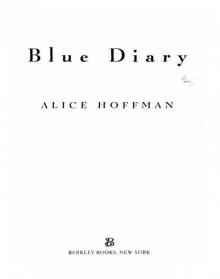 Blue Diary
Blue Diary The River King
The River King Here on Earth
Here on Earth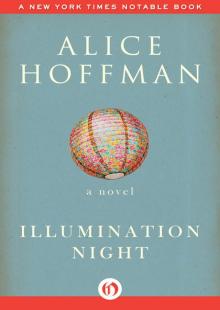 Illumination Night: A Novel
Illumination Night: A Novel The Marriage of Opposites
The Marriage of Opposites Nightbird
Nightbird Incantation
Incantation Skylight Confessions
Skylight Confessions The Ice Queen
The Ice Queen Second Nature
Second Nature Fortune's Daughter: A Novel
Fortune's Daughter: A Novel Seventh Heaven
Seventh Heaven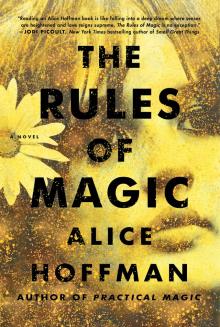 The Rules of Magic
The Rules of Magic The Red Garden
The Red Garden The Third Angel
The Third Angel White Horses
White Horses Property of / the Drowning Season / Fortune's Daughter / at Risk
Property of / the Drowning Season / Fortune's Daughter / at Risk Angel Landing
Angel Landing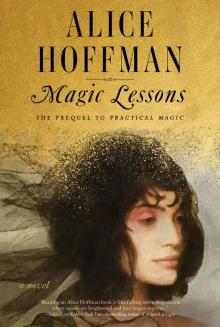 Magic Lessons
Magic Lessons Turtle Moon
Turtle Moon Aquamarine
Aquamarine The World That We Knew
The World That We Knew Faithful
Faithful The Dovekeepers
The Dovekeepers The Foretelling
The Foretelling Green Angel
Green Angel At Risk
At Risk Green Heart
Green Heart Fortune's Daughter
Fortune's Daughter Faerie Knitting
Faerie Knitting Incantation (v5)
Incantation (v5) Green Witch
Green Witch Practical Magic
Practical Magic The Museum of Extraordinary Things
The Museum of Extraordinary Things The Probable Future
The Probable Future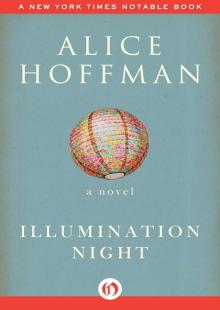 Illumination Night
Illumination Night The Dovekeepers: A Novel
The Dovekeepers: A Novel Property Of, the Drowning Season, Fortune's Daughter, and At Risk
Property Of, the Drowning Season, Fortune's Daughter, and At Risk